

Nuggets. Opportunity knocks — we answer. – Nuggets. Blockchain’s applications reach further than you think. The supply chain, food distribution, and energy will all be affected.
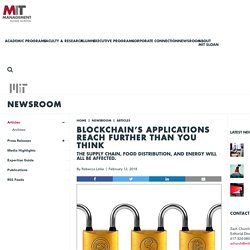
By Rebecca Linke | February 12, 2018 Why It Matters Blockchain technology is evolving rapidly, and so are its potential uses. Here’s where disruption could be coming. Many people are familiar with bitcoin, the cryptocurrency that doubled its price four times in 2017 before falling again in the new year. Blockchain: The Next Key Driver in Digital Transformation - Industry Today. Today’s supply chains need a makeover, as those that are not embracing digital transformation will become obsolete.
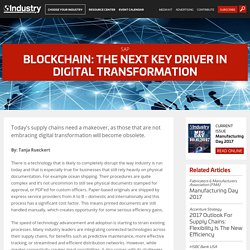
By: Tanja Rueckert There is a technology that is likely to completely disrupt the way industry is run today and that is especially true for businesses that still rely heavily on physical documentation. For example ocean shipping. Their procedures are quite complex and it’s not uncommon to still see physical documents stamped for approval, or PDF’ed for custom officers. Allianz Unveils Blockchain Prototype for Self-Insurance Products. Global insurer Allianz has unveiled a new blockchain prototype focused on "captive" insurance policies.

The prototype, the firm announced today, is aimed at providing a more streamlined approach for captive or self-insurance policies. With this type of product, a company will essentially insure themselves and their subsidiaries versus a more traditional policy purchase. Per Allianz, the complexities involved in this process – which can cover multiple jurisdictions – make the strong case for a more distributed solution. According to Allianz, Citi Treasury and Trade Solutions handled the payment process involved with the insurance. The prototype utilized the Hyperledger Fabric 1.0 software, which was published by the Linux Foundation-backed consortium of enterprises in July. Stellen wir uns vor: Blockchain als Genossenschaft! - Innovationsblog der DZ BANK Gruppe.
Banking Is Only The Start: 27 Big Industries Blockchain Tech Could Disrupt. The future of blockchain is near and banking isn't the only industry affected. See how law enforcement, ride-hailing, and others could also be impacted. What began as the basis of cryptocurrencies such as Bitcoin, blockchain technology — essentially a virtual ledger capable of recording and verifying a high volume of digital transactions — is now spreading across a wave of industries. Blockchain tech has gone far beyond its beginnings in banking and cryptocurrency: Annual global spending on blockchain applications has almost tripled since 2017.
Annual spending on blockchain solutions will reach nearly $16B by 2023, according to CB Insights’ Market Sizing Tool. Industries from insurance to gaming to cannabis are starting to see blockchain applications. How can creative industries benefit from blockchain? Many readers will be familiar with blockchain as the underlying enabling technology developed for Bitcoin, a cryptocurrency.

Klaus Schwab, Founder and Executive Chairman of the World Economic Forum, provides this summary in his book on the Fourth Industrial Revolution: “In essence, the blockchain is a shared, programmable, cryptographically secure and therefore trusted ledger which no single user controls and which can be inspected by anyone.” Blockchain has the potential to become a powerful disruptive force. A survey of 800 executives, featured in the same book, suggests 58% believe that up to 10% of global GDP will be stored using blockchain technology.
Microsoft Bets That Bitcoin-Style Blockchains Will Be Big Business - MIT Technology Review. Earlier this week a consortium of 11 giant banks including UBS and Credit Suisse announced that they had completed their first trial run of the idea of using software inspired by the digital currency Bitcoin to move assets around more efficiently.
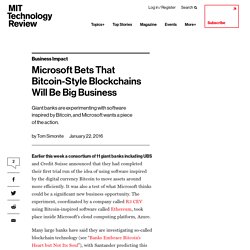
It was also a test of what Microsoft thinks could be a significant new business opportunity. The experiment, coordinated by a company called R3 CEV using Bitcoin-inspired software called Ethereum, took place inside Microsoft’s cloud computing platform, Azure. A Bitcoin-Style Currency for Central Banks - MIT Technology Review. The digital currency Bitcoin was designed to be independent of any government—a feature that also limits its mainstream appeal.
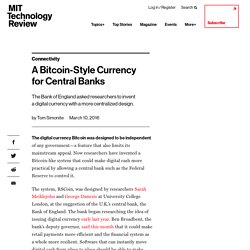
Now researchers have invented a Bitcoin-like system that could make digital cash more practical by allowing a central bank such as the Federal Reserve to control it. The system, RSCoin, was designed by researchers Sarah Meiklejohn and George Danezis at University College London, at the suggestion of the U.K.’s central bank, the Bank of England. The bank began researching the idea of issuing digital currency early last year. Ben Broadbent, the bank’s deputy governor, said this month that it could make retail payments more efficient and the financial system as a whole more resilient.
Software that can instantly move digital cash from place to place should be able to make many transactions, both large and small, faster and less costly. Why Bitcoin Could Be Much More Than a Currency - MIT Technology Review. Boosters of Bitcoin commonly call the digital currency the future of money.
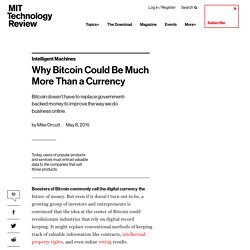
But even if it doesn’t turn out to be, a growing group of investors and entrepreneurs is convinced that the idea at the center of Bitcoin could revolutionize industries that rely on digital record keeping. It might replace conventional methods of keeping track of valuable information like contracts, intellectual-property rights, and even online voting results. Bitcoin’s real promise, they say, is not the currency. It’s the underlying technology, in which thousands of computers in a distributed network use cryptographic techniques to create a permanent, public record of every single Bitcoin transaction that has ever occurred (see “What Bitcoin Is and Why It Matters”). The World’s Largest Shipping Company Trials Blockchain to Track Cargo - MIT Technology Review. Moving millions of gigantic metal boxes around the world is hard work—but circumnavigating the associated paperwork can be even harder.
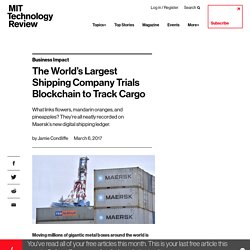
So the world’s largest shipping company has been trialing how it can make use of the digital technology behind the world’s most notorious cryptocurrency, Bitcoin, to make it a little easier. Bitcoin is built on what's called the blockchain: a digital ledger where each line is recorded based on the previous one using cryptographic techniques, making it almost impossible to modify at a later date. The ledger isn’t stored centrally, and multiple parties can agree by consensus that the details contained within it are accurate—which means that it's in everyone's interest to keep it so. That makes it perfect for recording financial transactions, but also doing plenty else, too. Bettina Warburg: How the blockchain will radically transform the economy. Blockchain Documentary. Identity Management per Blockchain: Ein neuer Hype? - Innovationsblog der DZ BANK Gruppe. A Film by Manuel Stagars - The Blockchain And Us Video Documentary - Released in Full - Blockchain News.
When the Wright brothers invented the airplane in 1903, it was hard to imagine there would be over 500,000 people travelling in the air at any point in time today.
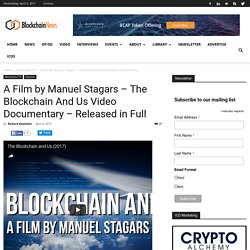
In 2008, Satoshi Nakamoto invented Bitcoin and the Blockchain. For the first time in history, his invention made it possible to send money around the globe without banks, governments or any other intermediaries. Satoshi is a mystery character, and just like the Wright brothers, he solved an unsolvable problem. Whenever this happens, it inspires incredible innovation. The G20 Countries Should Investigate Blockchain Technologies to Build an Inclusive, Transparent, and Accountable Digital Economy for All - Blockchain News. The Think 20 Engagement Group via their G20 Insights Platform that offers policy proposals to the G20, has reported that Blockchain technologies hold the key to building an inclusive global digital economy that is auditably secure and transparently accountable to the world’s citizens.

The G20 (or G-20 or Group of Twenty) is an international forum for the governments and central bank governors from 20 major economies. It was founded in 1999 with the aim of studying, reviewing, and promoting high-level discussion of policy issues pertaining to the promotion of international financial stability. According to a recent policy brief (Download full Policy Brief as PDF), they say Blockchains can play a critical role in strengthening economic resilience while ensuring the global economy works to the benefit of all.
The policy paper adds that G20 countries must prioritize investment in emerging technologies with the potential to further both objectives at once. 1. A. B. IBM Blockchain Car Lease Demo. Using blockchain to improve data management in the public sector. It’s not just for financial institutions; government agencies can use this digital ledger technology to protect trusted records and simplify interactions with citizens. An important function of government is to maintain trusted information about individuals, organizations, assets, and activities. Local, regional, and national agencies are charged with maintaining records that include, for instance, birth and death dates or information about marital status, business licensing, property transfers, or criminal activity.
Managing and using these data can be complicated, even for advanced governments. Some records exist only in paper form, and if changes need to be made in official registries, citizens often must appear in person to do so. Individual agencies tend to build their own silos of data and information-management protocols, which preclude other parts of the government from using them. Sidebar. Blockchain - TeleTrusT – Bundesverband IT-Sicherheit e.V. - Pioneers in IT security. - www.teletrust.de. 21 Companies Leveraging Blockchain for Identity Management and Authentication.
February 13, 2017 By : Elena Mesropyan Among the variety of non-financial use cases, blockchain technology can be applied to identity applications in areas such as digital identities, passports, e-residency, birth certificates, wedding certificates, IDs, online account logins, etc. Creating an identity on blockchain can give individuals greater control over who has their personal information and how they access it. By combining the decentralized blockchain principle with identity verification, a digital ID can be created to act as a digital watermark which can be assigned to every online transaction of any asset.
The True Cost of Bitcoin Transactions - Money and State. It seems the Bitcoin community is not correctly tallying the true cost of Bitcoin transactions. The belief is that Cost = Miner Fee. We’ll show why this is wrong, but the fee is of course part of the cost, so let’s examine it first… Fees are currently averaging in the range of $0.30 to $1.00 per transaction. Blockchain Primer. What is bitcoin and the blockchain? – MIT Media Lab Digital Currency Initiative – Medium. As bitcoin, ethereum and other cryptocurrencies have become more popular, we’ve gotten more and more requests from people seeking suggestions for how to learn about the technology.
In pulling together this list of starter articles, blog posts, books and courses, we’ve found that most people are initially willing to invest about 30–45 minutes to learn about cryptocurrencies. That can then ignite enough curiosity to invest another 2–3 hours — and then they’re off to the races. Feel free to share this list with others. Over the last year, members of the Digital Currency Initiative have sent it to several hundred people — from finance ministers to longtime developers interested in the cryptocurrency space and, as a result, have seen them change their policy position or even change jobs.
Blockchain Demo. The Blockchain is the new Google. The following is an excerpt from The Business Blockchain: Promise, Practice, and Application of the Next Internet Technology by William Mougayar. In it, Mougayar waxes ecstatic about the future of distributed databases. Papers – OIX. International Identity Law & Policy Workshop – OIX. The Open Identity Exchange, along with the American Bar Association’s Identity Management Legal Taskforce and the World Bank, hosted a workshop on January 14, 2015 in Washington D.C. with the objective of discussing the main concerns surrounding the adoption of identity management law and policy, helping to develop a common language around internet identity.
Attendees included industry leaders in identity and relevant regulatory bodies. BlockCypher and ShoCard partner on blockchain-based identity management. Nov. 8, 2016 BlockCypher, a blockchain web services provider, and ShoCard, which provides identity solutions on blockchains, have partnered to provide the market’s first identity management solution that scales across public and permissioned blockchains, according to a press release. Blockchain tech powers identity management. How blockchain technology disrupts securities registration. Does digital identity need blockchain technology? Everywhere you turn it seems there are research projects, new product proposals and services claiming a new dawn of blockchain driven technologies that fix a multitude of problems.
Identity is a space where many of these claims are being made so it is useful if we explain our thinking and the approach we are advising when it comes to digital identity. When is a blockchain not a blockchain? – Naked Security. Its Blockchain. Its blockchain - Building Global Blockchain Community. Blockchain GovHack - Blockchain Technology Resources. BITCRIME. Orlowski oth - Recherche Google. David Birch - How to use Identity & the Blockchain. Applying Blockchain to Identity - Chris Skinner's blog.
ShoCard. Digital Transformation: How Blockchain Will Change Organizations. Reboot the bank's boardroom NOW! - Chris Skinner's blog. There is more to blockchain than moving money. It has the potential to transform our lives - here's how. The Mark News. What Blockchain Means for Higher Education. Blockchain – programmiertes Vertrauen - Intelligente Welt. The Blockchain for Education: An Introduction. Mit Blockchain alte Strukturen entfesseln › cloudikon. All you need to know about blockchain, explained simply. Forbes Welcome. How blockchain will defend the Internet of Things. How blockchains could change the world. Tech Savvy: How Blockchains Could Transform Management.
Disruptive Innovation in FinTech. A gentle introduction to smart contracts. A gentle introduction to blockchain technology. Confused by blockchains? Revolution vs Evolution. Amazon Announces Blockchain-as-a-Service (BAAS) Sandbox for Developers - Blockchain News. Finance and Beyond: An Infographic Map of Bitcoin and the Emerging Blockchain Ecosystem. Whatever next generation banking is … it won’t be banking – Chris Skinner's blog. The Blockchain Explained to Web Developers, Part 1: The Theory. From Credit Scores To Investment Management: 102 Startups Digitizing The Bank. The Most Active Financial Services Firms and Strategics Investing in Bitcoin Startups.
IBM launches blockchain cloud services for government, healthcare sectors. The Don Tapscott Thinkers50 Video Blog - Thinkers 50. Blockchain won’t kill banks: Brock Pierce. Distributed Ledger Visible To All? Ready for Blockchain? How blockchain is likely to transform IT and business. Episode 5: Blockchain - The Great Disruptor. Episode 4: BlockChain - Explain it like I am 5. The Blockchain Explained. Bitcoin might fail but the blockchain is here to stay - Full WIRED Retail talk.
Blockchain for dummies. Blockchain Explained, What is Blockchain? How Blockchain could change finance. How Bitcoin’s Blockchain Could Power an Alternate Internet — Backchannel. Blockchain and decentralization hold big implications for society. Promoting a free, decentralized and open future. Smart Contracts: Vertragsabwicklung durch Computer. Der digitale Lenin hinter der Blockchain. Einmal Blockchain zum Mitreden, bitte!